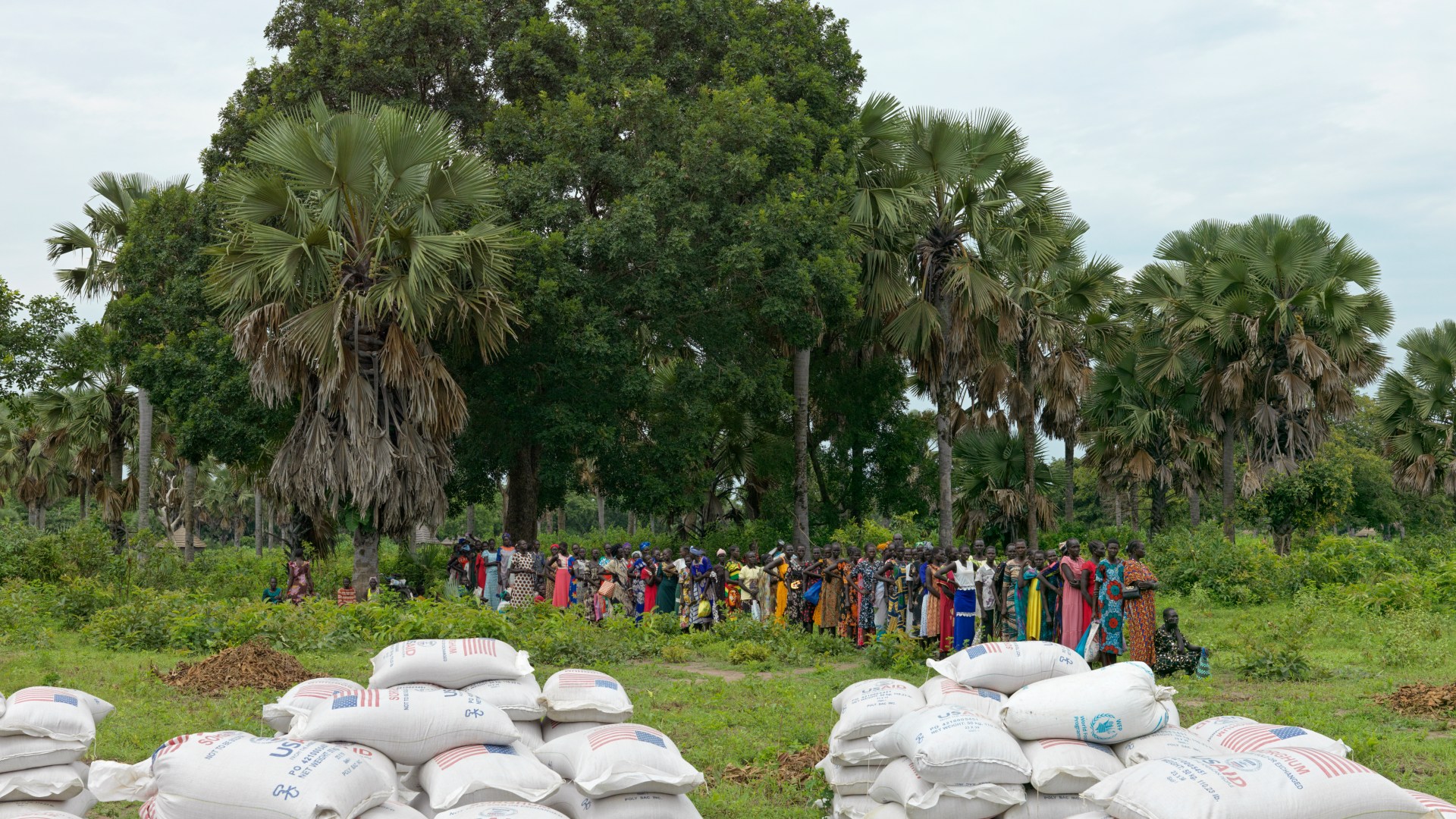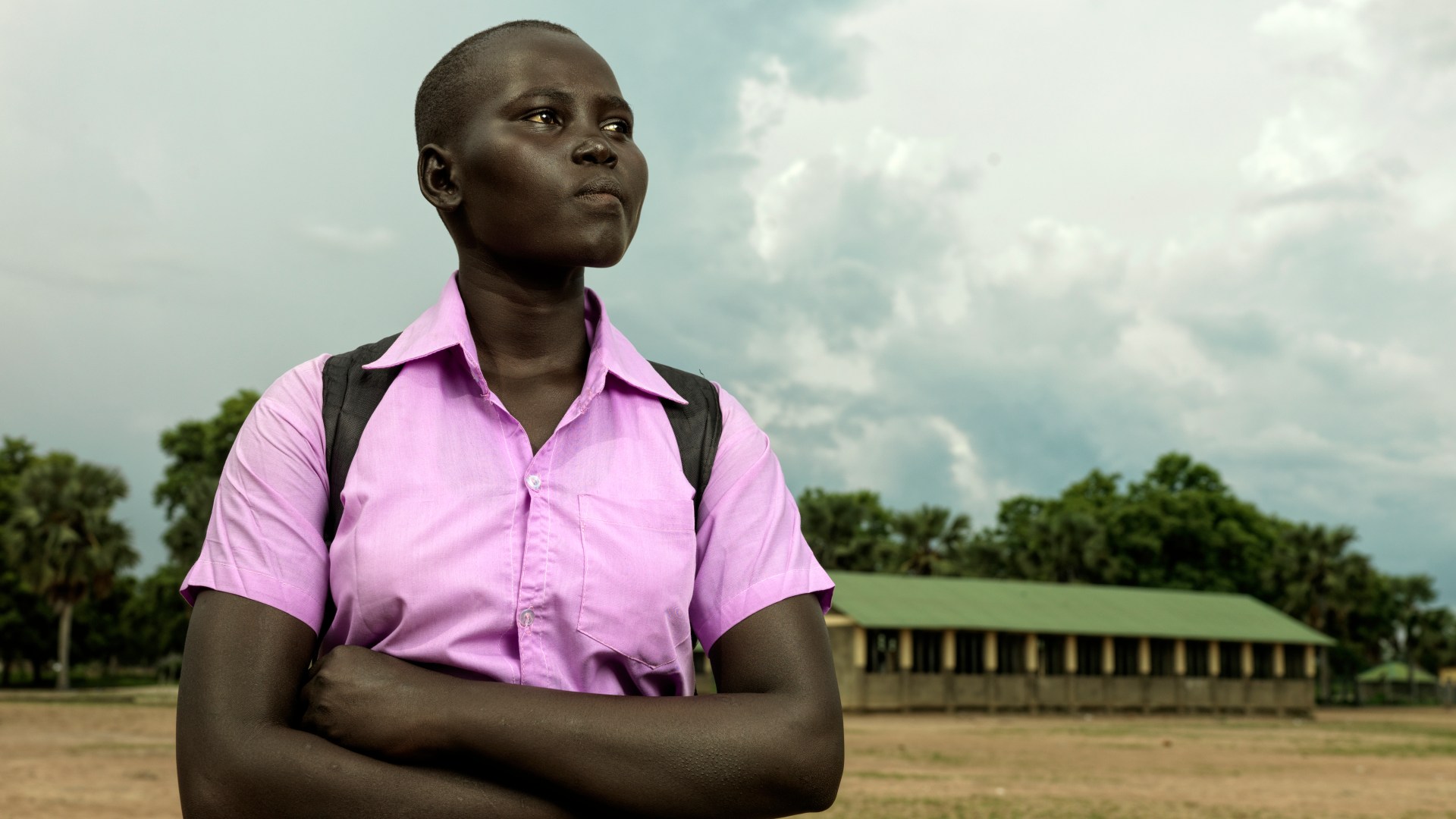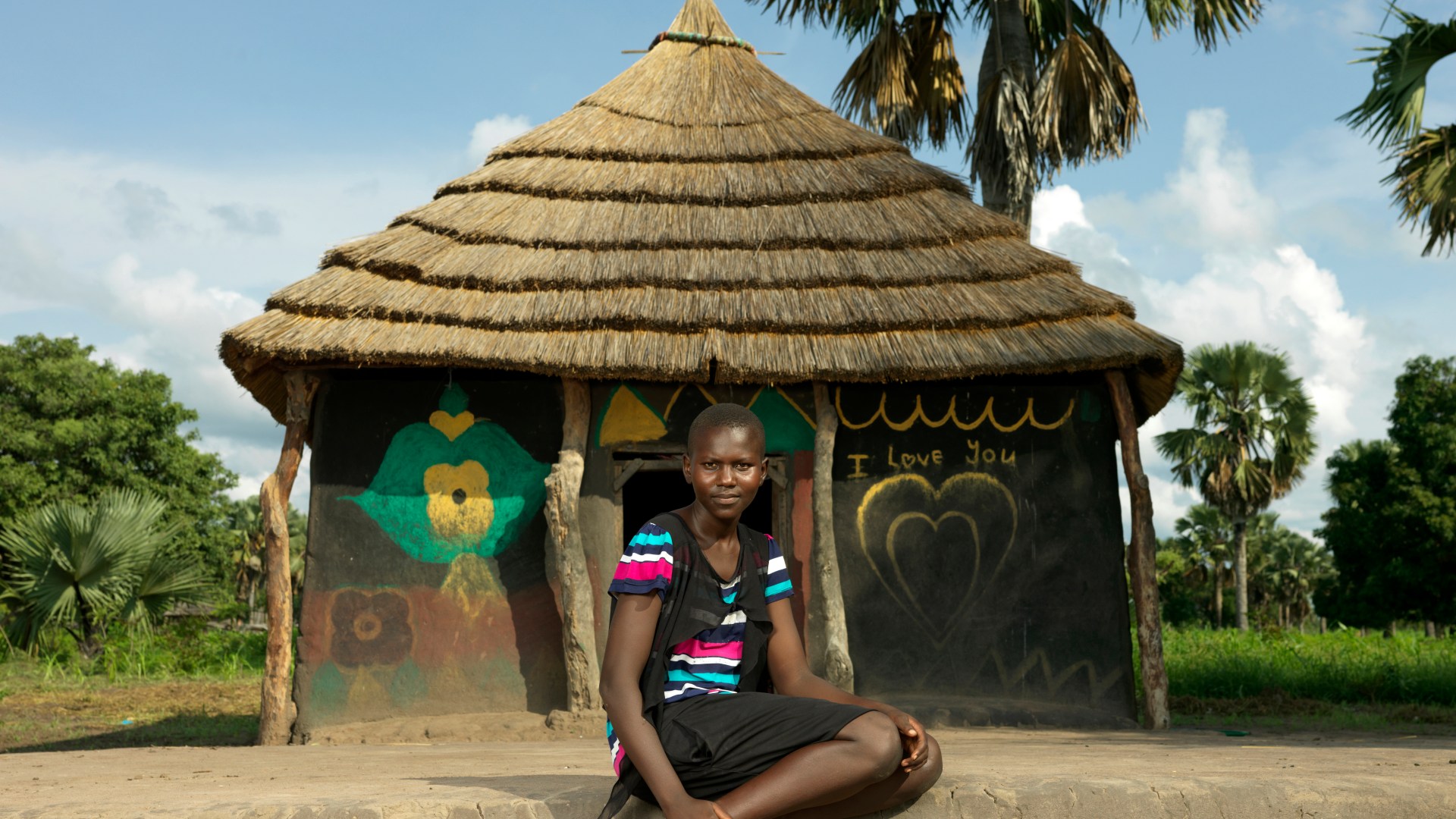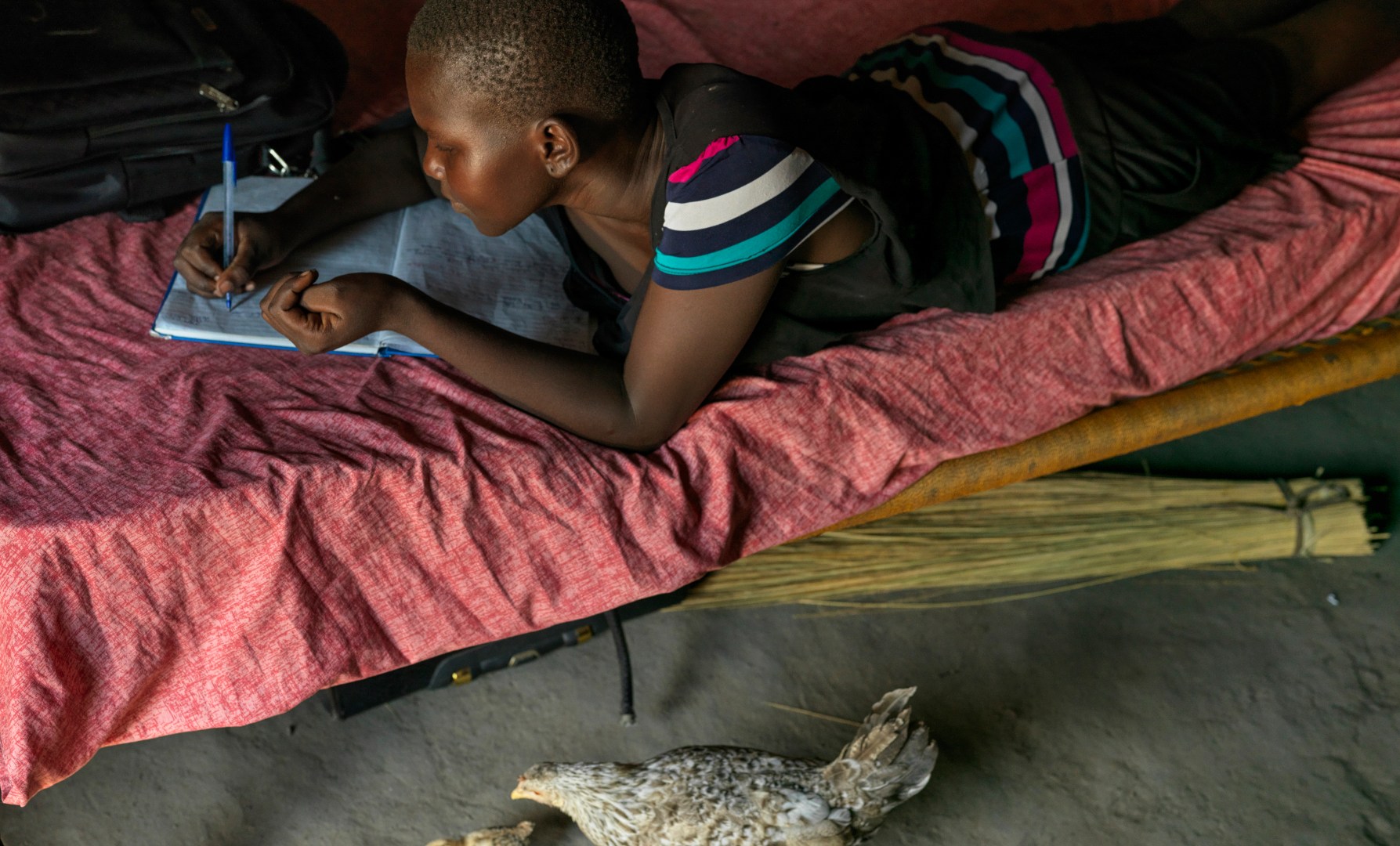‘Girls have less food to eat’ Hungry and out of school in South Sudan.
Rumbek, South Sudan – “There are times when I feel so hungry that I think going to school would be a waste,” says 15-year-old Martha*, as she packs her maths textbook into her school bag when the bell sounds for recess. “Some days I stay at home,” she admits.
On a normal day, her primary school in Rumbek in South Sudan’s Lakes State welcomes thousands of children. The concrete classrooms are usually packed with pupils in matching brown and bright purple uniforms.
However, lately, fewer children have been arriving each day. Many, especially girls, are staying at home instead as the country struggles to cope with rising hunger levels. Some are urged to help as their parents go out in search of food, while others eat less so the men and boys in the family get more of what little there is.
South Sudan, the world’s youngest country, has faced multiple hunger crises throughout its 11 years of independence. Currently, about 7.7 million people, or 63 percent of the population, face acute food insecurity.
The crisis is due to a combination of factors including the effects of COVID-19, years of climatic shocks (floods, dry spells, and droughts), and conflict, which is forcing families to flee their homes. This has left the nation ranked among the world’s hungriest countries.
This year, the problem is exacerbated by critical aid funding shortages, in part due to rising global food prices because of the war in Ukraine – shortages that have forced NGOs to cut back food distributions and school meal programmes. Ukraine is a major exporter of grain, wheat, corn and sunflower oil, but as Russia’s invasion blocked shipments, global food supplies dwindled and prices rose. Although a deal was recently reached to unblock some ports, the global effects of the shortages are already being felt.

With South Sudan experiencing its worst drought in decades, NGOs are helping distribute food aid to those in need [Peter Caton/Plan International]
“Children are the ones suffering the most in this crisis, mainly girls,” explains Mary Nyanagok, a gender and protection officer for NGO Plan International, which provides food assistance for tens of thousands of people in South Sudan. “With more than half of the population facing high risk of acute food insecurity, we need to act fast before it is too late.”
When food is scarce, girls often eat less and eat last, the NGO says. Women and girls account for 70 percent of the world’s hungry. And as families and communities come under strain, girls are more likely than boys to be taken out of school, and will be at risk for early and forced marriage, gender-based violence (GBV), sexual exploitation and unwanted pregnancy.
Martha, who is the oldest of seven children, wants to be a doctor. But even her primary schooling is being impacted.
“My father sometimes asks me to stay at home and help him look for food,” she says, twiddling her fingers and trying to remember the last time she didn’t feel so hungry. “He also asks my younger sister to stay at home instead of going to school and spending the whole day hungry.”
Even on the days Martha does attend classes, she says that she falls behind and finds it difficult to understand the new lessons. “There was a topic that was taught when I wasn’t at school, so I tried to catch up, but it’s difficult because the explanation my friends gave me was different from the way the teacher taught it.”

Martha, (centre), and her friends miss out on school more often as the hunger crisis worsens [Peter Caton/Plan International]
Clement Makuak has been a teacher for more than 16 years, teaching mathematics, science and English. Each day when he takes the register at the school Martha attends, he says he counts fewer and fewer children in his classroom.
“When I come to school and make the attendance calls in class, I’ve found some gaps. Girls especially are not turning up to school. I call their names out, asking ‘Where is this or that girl?’ But they’re not in the classroom.”
On a regular day at noon, hundreds of children would queue up in windingly long lines to receive their school lunch. A hunger-stifling, powerful combination of beans and rice was served daily to eager students, many of them motivated to attend school for the food that they received.
The food crisis affecting families like Martha’s has resulted in many children having to rely on the school meal programmes – usually provided by NGOs, with main funding from the World Food Programme (WFP) – to have at least a second meal a day. However, due to country-wide funding cuts, NGOs have been forced to limit programmes to a smaller number of schools.
Martha’s school is one of 38 within Lakes State that Plan International supports with school meal programmes, through which it provides lunches to 21,000 children a day. Previously, the organisation had supported 71 schools, but this year it says it has been forced to scale back programmes after losing critical funding from the WFP.
Although NGOs are working to secure funding from new sources to reach more families, the cuts mean that many schools cannot offer meals at all. As a result, many children across Rumbek now eat only one meal a day.

Hellena’s family depends on their farm for food and an income, but they have struggled since the dry spell started [Peter Caton/Plan International]
“We only eat once a day, in the evening, but in the morning and at lunchtime we don’t eat,” says Hellena*, another pupil at the school Martha attends. The 17-year-old speaks shyly, as it is not common to talk about lack of food or hunger in the community.
Hellena looks healthy, yet, like many of her peers, she isn’t eating enough food at a key age for growth and mental development since it hasn’t rained on local farms for almost two months.
“The crops that my parents normally grow are peanuts, sorghum, and maize. But we haven’t harvested because the rain has taken a long time to come.
“Now, we eat pumpkin leaves. It’s only the plant that has survived, but it didn’t bear any fruit,” she explains.
The family struggles to pay for school fees and food with the small income they get. Hellena’s father sells small bags of sugar by the roadside and her mother used to sell peanut paste, but she has stopped since she cannot afford to buy the peanuts at the ever-increasing market prices.

Teacher Clement Makuak is concerned about his students dropping out of school due to the hunger crisis [Peter Caton/Plan International]
“Life has become very difficult for me and my classmates,” Hellena says, sitting next to her friends at school who all find it hard to study since the food crisis began. She finds it especially tough to concentrate on and understand her afternoon classes. “I feel that I can only be very active and pay attention in the morning up to 11am, but from then on I can no longer pay attention.”
Like Martha, many of the other girls have also skipped class.
Hellena explains that she’s stayed home several times because there is no one else to look after her siblings while her mother looks for food.
“Sometimes you’ll see a friend at school, then the next day she is missing. Their attendance can be on and off,” she adds.
When schoolteacher Clement visited the home of one of his female students who had stopped attending class, he found that she had been tasked with household chores and looking after her younger siblings while her parents went out in search of food and water.
“I followed up at home to ask the parents why one particular girl wasn’t coming to school. When I arrived at their home, I found the girl alone,” he shares. “Her parents were not there, and when I talked to her she said to me, ‘My parents told me to stay at home to look after the children, fetch water, and to look for some food for the children while they are out looking for food.’”

Grace says she now only eats once a day [Peter Caton/Plan International]
Grace*, 14, dreams of one day becoming a computer scientist, but she too has been struggling to concentrate on her studies recently. “I only eat once a day,” she says in a soft and low tone while sitting near the open kitchen at her home in Rumbek, where the family just ate what she cooked.
“Today I ate pumpkin leaves, but it’s not enough. I feel like I still need more. Later, when I start doing homework and other things like fetching water, which is far away, I will feel weak and without enough energy.”
Although Grace’s family lives near her school, water has always been far away and she needs to walk for 30 minutes to reach a water point.
The presence of food also dictates her family’s daily priorities – whether Grace will need to help look for things to eat, or stay home to help take care of the younger siblings, wherever her help is most needed.
“I have skipped class sometimes because there was a time when we didn’t even have any green leaves. So, I had to stay with the children while mum went to look for food. I felt bad; I wanted to go to school,” Grace says.
Yet, even when there is some food at home, and she gets to go to school, she struggles to stay focused and understand her lessons.
“During a lesson, if you haven’t eaten anything, you don’t feel like writing. You don’t feel like listening to anything that the teacher is telling you.”

Clement says there are fewer and fewer children in his classroom [Peter Caton/Plan International]
Gender is linked to hunger in ways that are often overlooked, says Plan International. “Looking at the local context of Rumbek and how gender and GBV issues can affect people who are also in need of food assistance is important,” Nyanagok explains.
“This is particularly important during dry spells, like the one which just affected the community. During these periods people can’t cultivate, so they end up with no food, and as a result gender disparities can happen.”
Last year was also not an easy one in Rumbek as community groups fought one another, and violence ranged from cattle raiding to revenge killings, schoolteacher Clement explains. The continuous fighting prevented the community from cultivating their lands, which already affected the availability of food even before the crises this year hit local communities.
“What happened this year is that there is hunger,” Clement says. “Last year people were in a community crisis, there was a lot of fighting that prevented the people from farming. Then, the rain not coming this year was a big problem because we survive on rainfall. When there is rain, we plant our seeds.”
Teachers like Clement are making efforts to get girls back into school.
“Although it is clear that both boys and girls are affected by this situation, girls will be more at risk,” he laments. “Our parents here think that it should be the girl who stays at home and takes care of the children for hours or even a few days. This is so that the mother can go far distances looking for food. So, when this happens, I call the parents to school and tell them about the importance of a girl’s education.”

With limited food, Grace often eats less than the boys in her family [Peter Caton/Plan International]
Despite these strides – and even though girls may return to school – the challenges of diminished food supplies, hunger pangs and its effects continue.
As a girl, Grace often finds herself eating less than boys. “The girl is the one who serves the food for their mothers, so when mum says, ‘Add some food for the boys,’ you do it. I see that as if they’re not being fair to us, because, why add food for the boys and not for us? We’re just the same. But I would never say this to anyone because it’s not good. It’d be like I don’t want my brothers having more food.”
Nyanagok from Plan International says: “We have encountered many situations where girls have less food to eat compared to boys. It is a cultural thing…”
“As a girl, you are the one who cooks and your brothers are supposed to be given more food. In our culture there is a prioritising of boys.”
In raising awareness with communities, “we tell people that boys and girls are equal, especially the children because they are growing so they need an equal share of food”, Nyanagok adds.
“These are things that happen in the community and we are targeting them. Because of the raising of awareness through activities, there are a lot of changes happening,” she says.

Although they are eager to learn, many students are too hungry to concentrate on their lessons [Peter Caton/Plan International]
However, the challenges that local communities now face inevitably take a toll on those most vulnerable, Nyanagok says.
“The current funding crisis and the hunger crisis brought on by the dry spell have deeply affected the community and especially the more vulnerable people have taken the brunt of the crisis.”
Especially for children, “it is really hard and heart-breaking”, she says.
“Many children used to wake up and were mentally prepared knowing that they were going to school and would have something to eat there. So, they woke up excited to go to school. But now, they lack motivation because they go from morning till late afternoon without eating at all.”
Many of the children at this school – and across South Sudan as a whole – are now lucky to get one full meal a day, Plan International says.
“January was the last month that I ate two meals,” Martha admits, saying her family only eats once a day now: posho, or corn meal, with a sauce and salt.
“During this time of drought, I feel hungrier. I feel weak. When I’m doing something I can’t manage it like before. I also get stomach aches and headaches,” she says. “It feels bad.”



